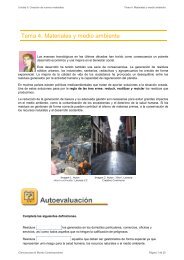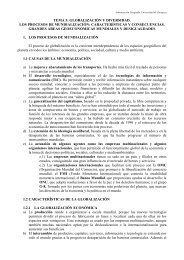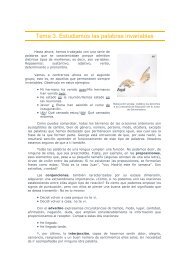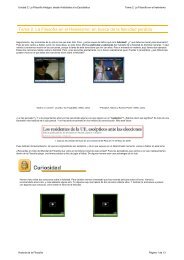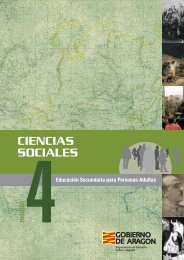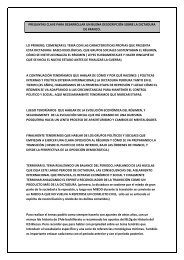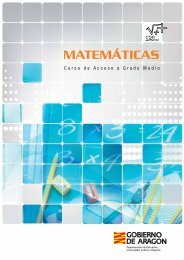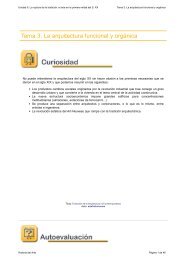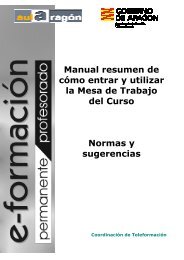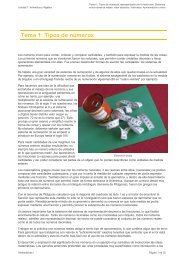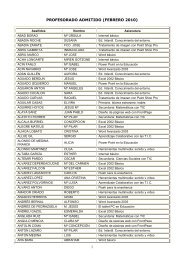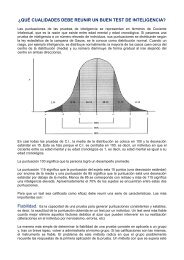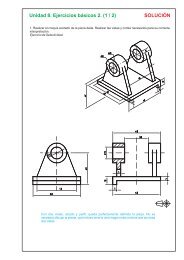Educación Secundaria para Personas Adultas 2módulo - aulAragon
Educación Secundaria para Personas Adultas 2módulo - aulAragon
Educación Secundaria para Personas Adultas 2módulo - aulAragon
Create successful ePaper yourself
Turn your PDF publications into a flip-book with our unique Google optimized e-Paper software.
Unit 4: New technologies<br />
IMPORTANTE<br />
– CAN y COULD son verbos modales, lo cual quiere decir que:<br />
Sólo tienen una forma (CAN / COULD). No cambian con ninguna persona (no tienen –s en la 3ª<br />
persona del singular, por ejemplo)<br />
Van siempre seguidos de un infinitivo sin TO<br />
Julia could run ten miles when she was younger Julia podía correr diez millas cuando era más joven<br />
They can't use the mobile at school<br />
No pueden usar el móvil en el colegio<br />
Can I go to the toilet?<br />
¿Puedo ir al baño?<br />
Could I have something to drink?<br />
¿Podría beber algo?<br />
SHOULD - DEBERÍA<br />
Affirvative form<br />
Negative form<br />
I/you should<br />
I/you shouldn't<br />
He/she/it should<br />
He/she/it shouldn't<br />
We/you/they should<br />
We/you/they shouldn't<br />
• Should not = Shouldn't<br />
• En forma interrogativa, invertimos el verbo y el sujeto:<br />
Should I tell the manager? ¿Debería decírselo al gerente?<br />
SHOULD se usa:<br />
• dar consejo:<br />
John goes to bed very late ↑ He should go to bed earlier Debería irse a la cama antes<br />
Smoking is bad for you↑ You shouldn't smoke so much No deberías fumar tanto<br />
• hacer recomendaciones:<br />
The film is really good ↑ You should go and see it Deberías ir a verlo<br />
IMPORTANTE<br />
SHOULD es un verbo modal:<br />
Sólo tiene una forma <strong>para</strong> todas las personas. No tiene otro tiempo verbal tampoco (SHOULD).<br />
Siempre va seguido de un infinitivo sin TO<br />
MUST / HAVE/HAS TO – DEBER, TENER QUE<br />
● MUST<br />
Must: deber, tener que<br />
Mustn't: estar prohibido, no deber<br />
Affirvative form<br />
Negative form<br />
I/you must debo / debes I/you mustn't no debo / no debes<br />
He/she/it must debe He/she/it mustn't no debe<br />
We/you/they must debemos/debéis/deben We/you/they mustn't no debemos ...<br />
• Must not = Mustn't<br />
• En forma interrogativa, invertimos el verbo y el sujeto:<br />
Must you work so much? ¿Debes/tienes que trabajar tanto?<br />
Must es un verbo auxiliar modal. Se usa <strong>para</strong>:<br />
• Expresar obligación:<br />
You must stop now<br />
Debes <strong>para</strong>r ahora<br />
• Expresar que algo es esencial o necesario:<br />
She must work harder<br />
Debes/tienes que trabajar más<br />
Educación <strong>Secundaria</strong> <strong>para</strong> <strong>Personas</strong> <strong>Adultas</strong><br />
[ 153 ]



